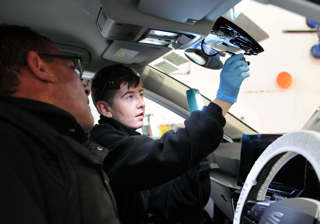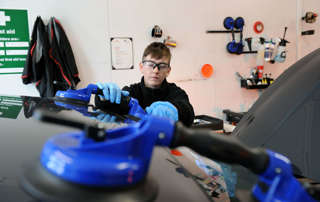New research reveals a worrying lack of awareness among UK drivers about the dangers of driving with a cracked or incorrectly fitted windscreen.
Windscreens can account for up to 30% of the structural integrity of a car, yet research from Autoglass shows drivers are largely unaware of the safety risks posed by compromised windscreens.
The survey of 1,000 UK drivers found that more than half (53%) are not aware that a correctly fitted windscreen is essential to a car’s roof crush resistance in a roll over situation.
A worrying 71% of drivers are unaware that an incorrectly fitted windscreen can impact effective passenger airbag deployment.
Jeremy Rochfort, national sales manager at Autoglass, said: “We carried out crash tests at a speed of 30mph to see what the effects were of an unbonded windscreen.
“Upon impact, the windscreen was completely displaced which caused the passenger airbag to inflate outside the confines of the vehicle.
“The result was that the airbag became incorrectly positioned to deliver the full safety benefits when the dummy first struck the airbag.”
The research also found that 78% of drivers are massively under-estimating the amount of force that would be created by their body in even a relatively slow collision.
In fact, in a head-on collision at 30mph your body exerts as much force as an object or animal equivalent to 1000kgs in weight as it is forced towards the windscreen. This is roughly the same weight as a polar bear, a hippopotamus or a small car.
The risk of serious or fatal injury has been shown to be increased between three and 40 times for ejected occupants compared to being retained inside the vehicle.
The research also reveals that the majority of UK drivers are unaware of the crucial role the windscreen plays in maintaining the structural integrity of their car.
When asked what they considered to be the most important safety features in a car, the majority of drivers ranked windscreen as only the fifth most important factor, despite the fact that it can account for up to 30% of a car’s structural integrity.
In the past ten years, the amount of glass in cars has increased by 15%. What’s more, a growing number of new safety technologies are being incorporated into the windscreen glass, meaning it will become an even more valuable safety feature which requires effective maintenance.
Beyond the safety risks posed by a compromised windscreen, UK drivers are alarmingly unaware of what makes a car roadworthy.
Almost half (43%) don’t realise driving with a cracked windscreen could be considered an offence by a road traffic officer.
What’s more, almost 10% of drivers don’t know that driving without insurance is illegal, a fundamental rule of the roads.
Rochfort concluded: “We want to raise awareness of the power of the windscreen when it comes to protecting motorists on the road.
“Duty of care is a top priority for fleet managers so it goes without saying that safety is of paramount importance.
“Fleet drivers need to be aware of the crucial role the windscreen plays in the event of an accident. Every chip will eventually crack.
“It is also critical to invest in a good quality glass replacement. Autoglass will only use glass manufactured to OEM standards, ensuring that the glass we fit is as good as the original piece of glass we are replacing.”



















Glasstec_Paul - 30/03/2015 14:16
"“It is also critical to invest in a good quality glass replacement. Autoglass will only use glass manufactured to OEM standards, ensuring that the glass we fit is as good as the original piece of glass we are replacing.”" This statement suggests that aftermarket glass is as good as its OE counterpart. A very bold - and somewhat risky - claim to put your name against when even the (glass) OEMs won't confirm either way, using words such as the (non-OE) glass "responds" to "main technical" and "aesthetic criteria" as the original. A fake, 'knock off' Gucci handbag bought on the black market will also 'respond' to 'main technical' and 'aesthetic criteria' as the genuine item available only from Gucci outlets. Aftermarket glass is, "as good as" original 'genuine' glass? Really?